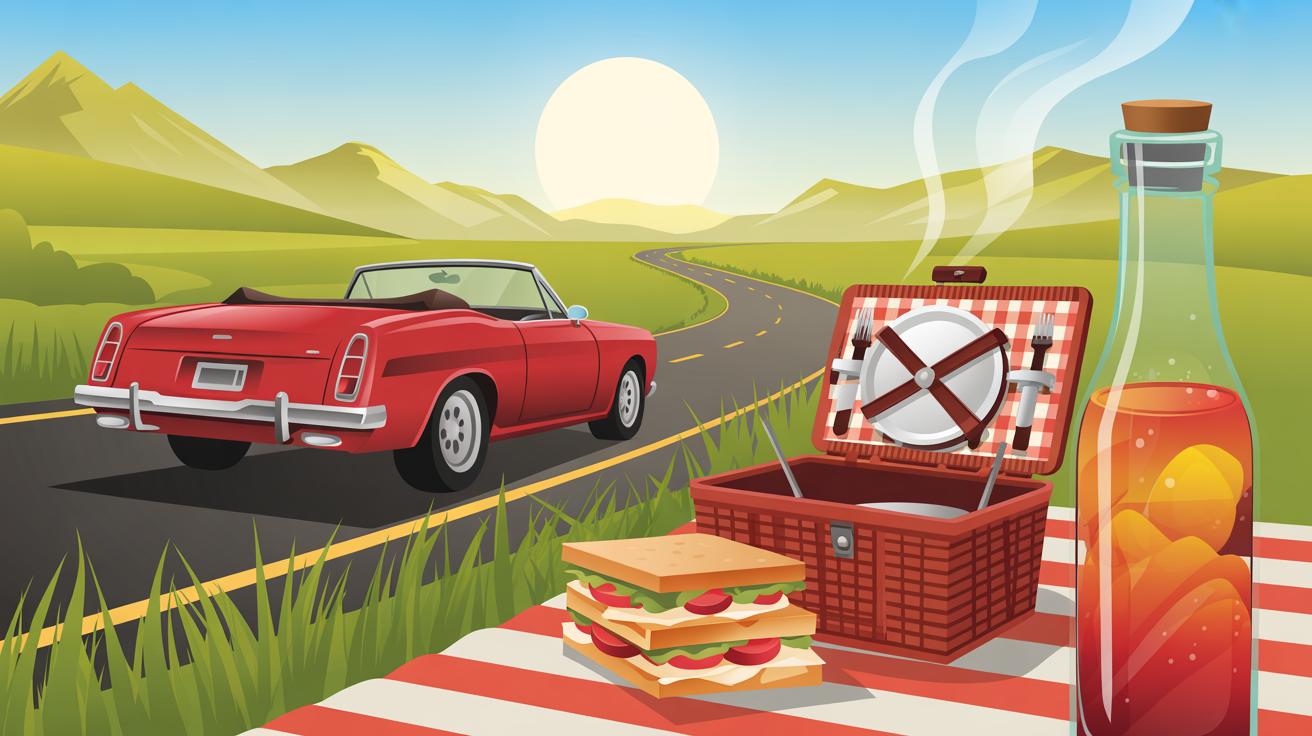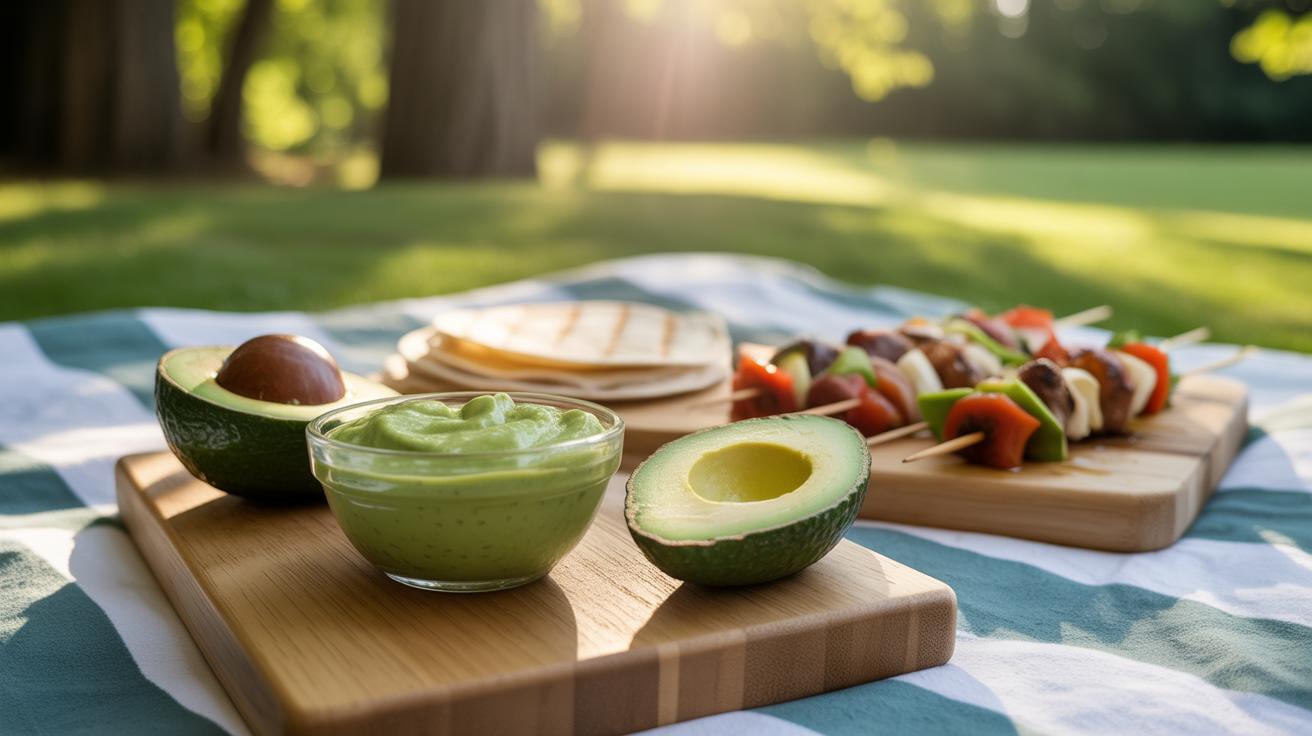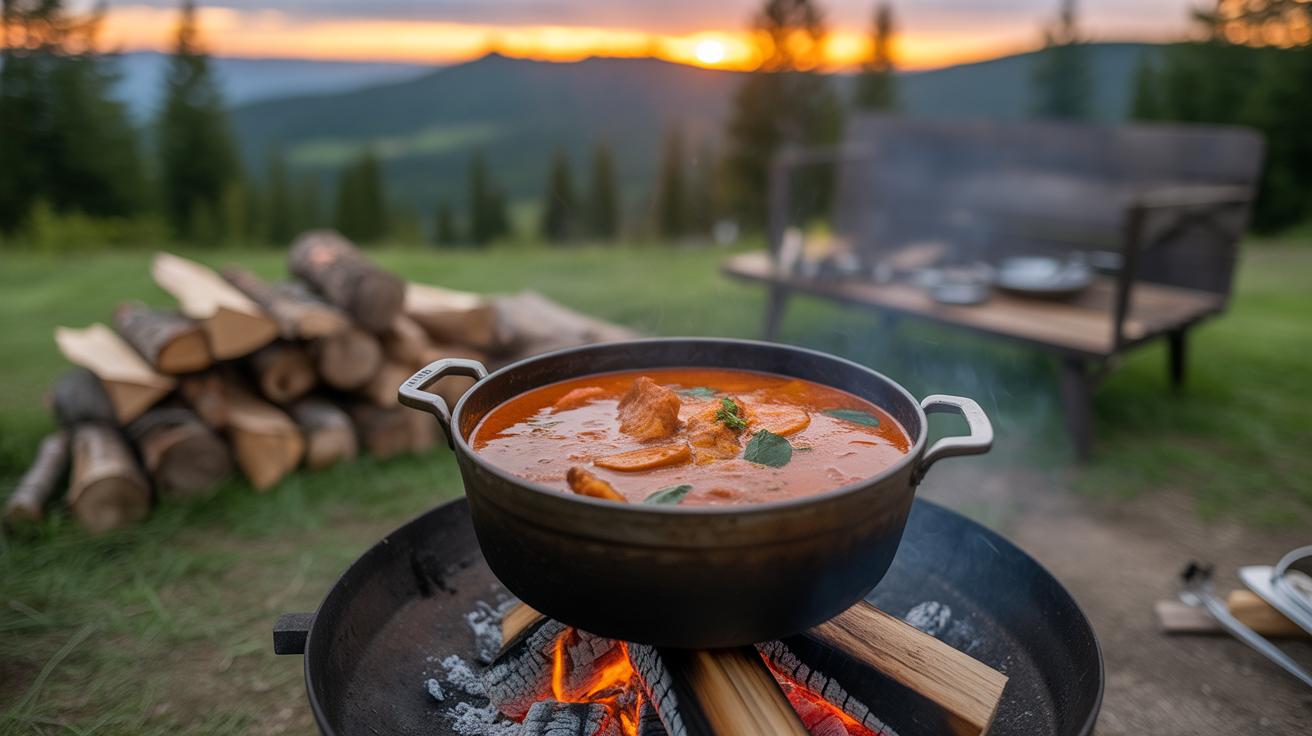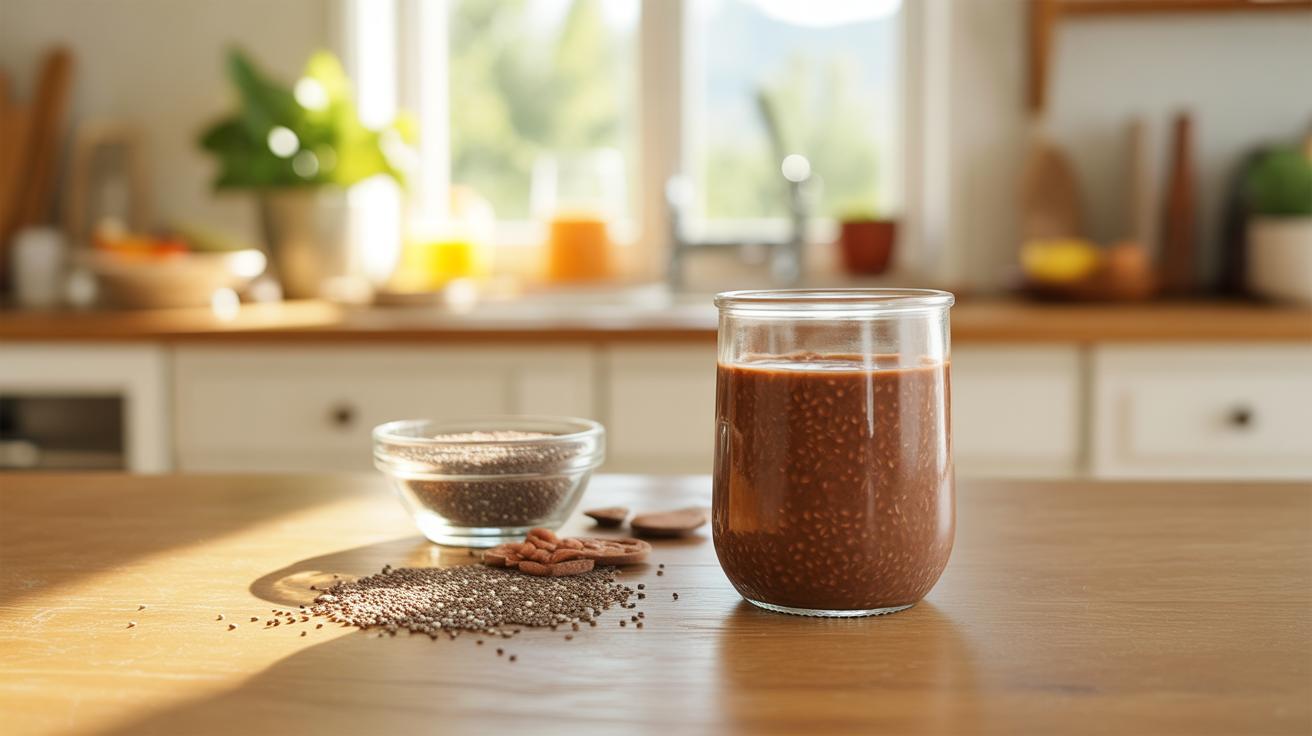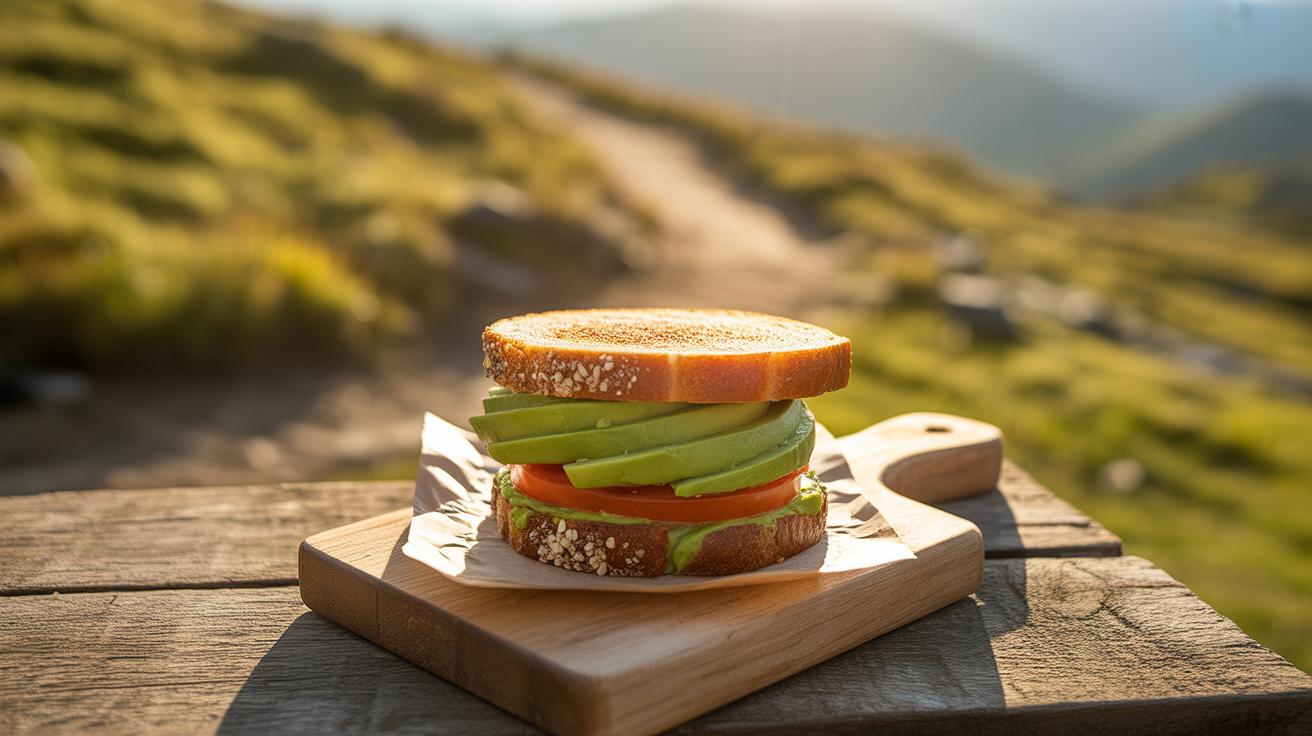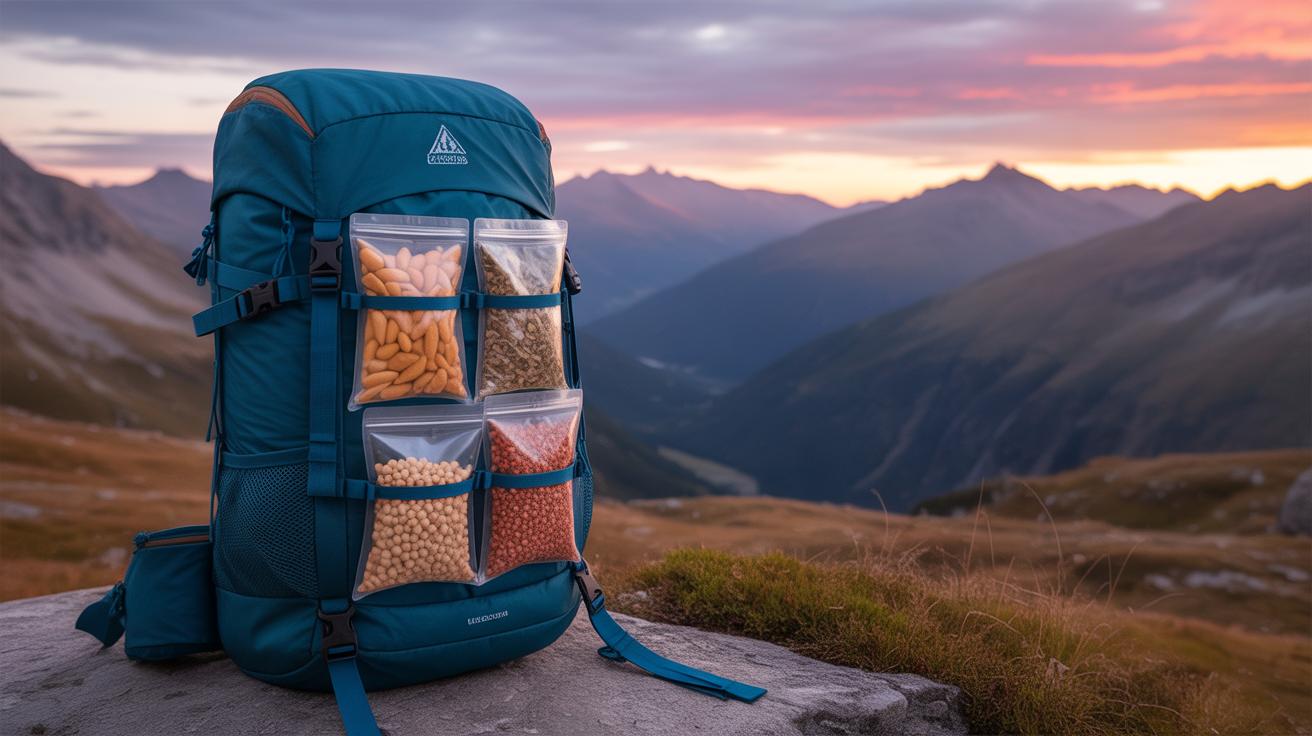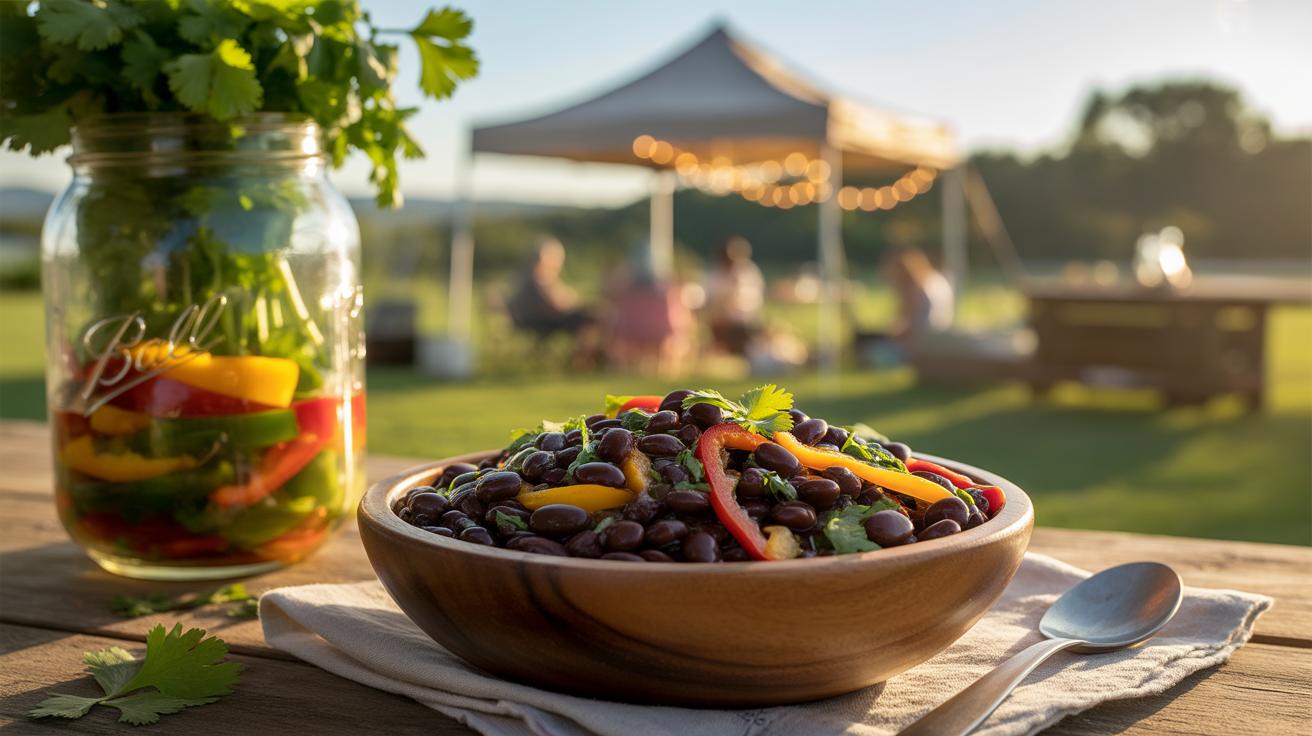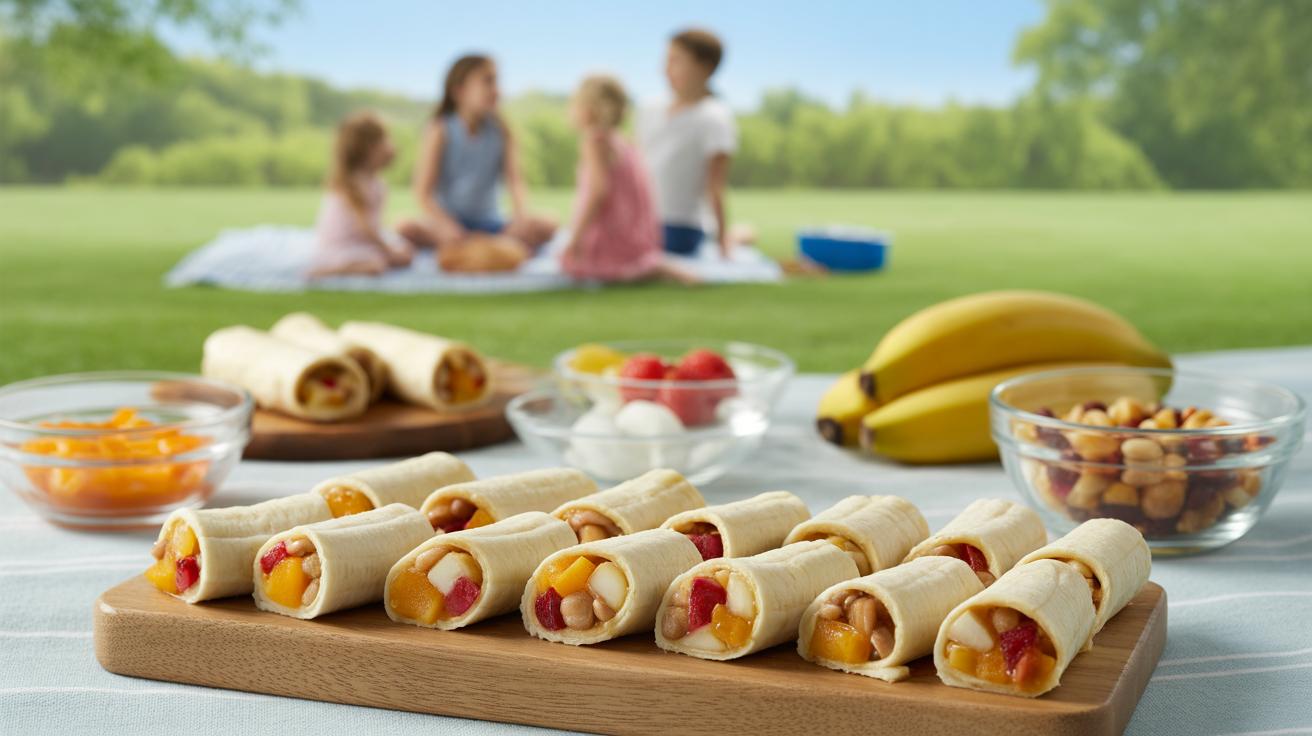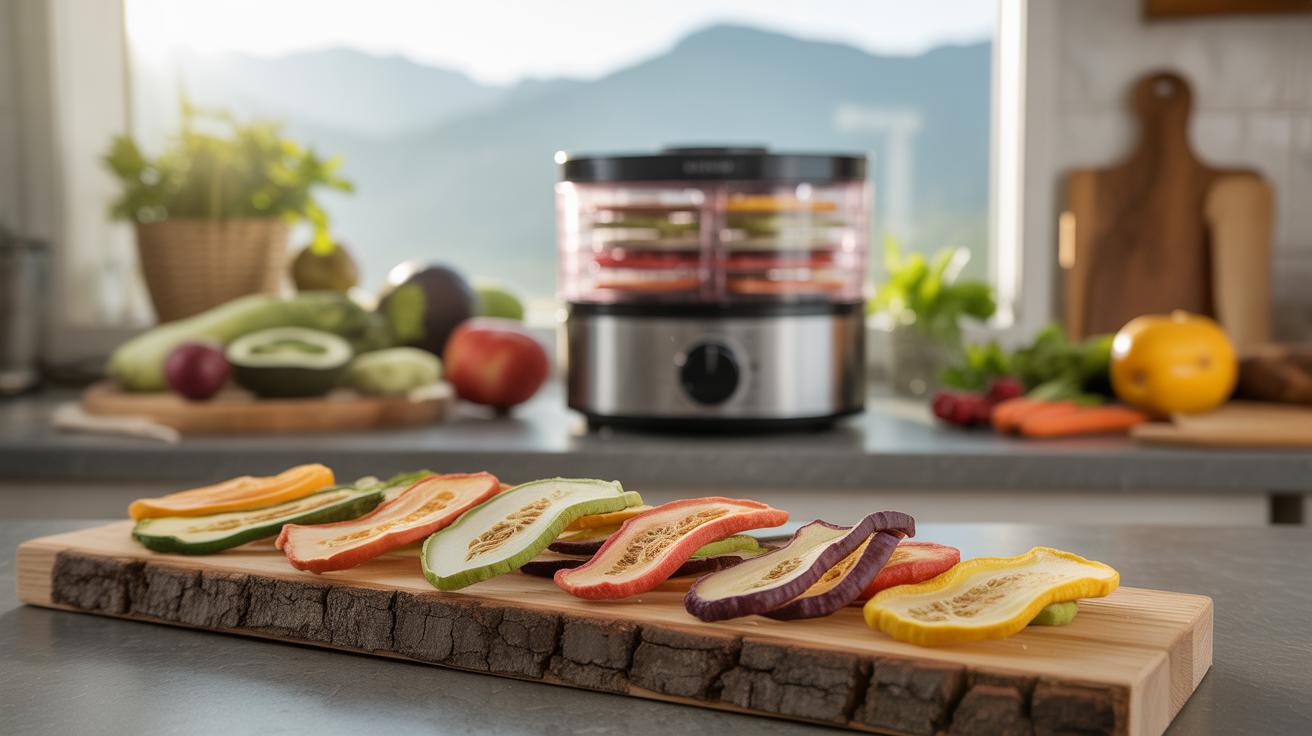Introduction
Taking a road trip can be fun and full of adventure. But what you eat on the road can make a big difference in how you feel during your trip. Simple road trip food choices help you stay full, happy, and ready to explore, without extra stress. Planning your food well can make your journey smoother and more enjoyable.
This article looks closely at smart food options you can pack and enjoy while traveling. From easy snacks to healthy meals, you will find practical tips to eat well on the road. You’ll learn how to prepare and store food, what to pick, and how to keep energy levels up. Let’s dive into easy road trip food ideas that keep travel stress-free.
Why Planning Your Road Trip Food Matters
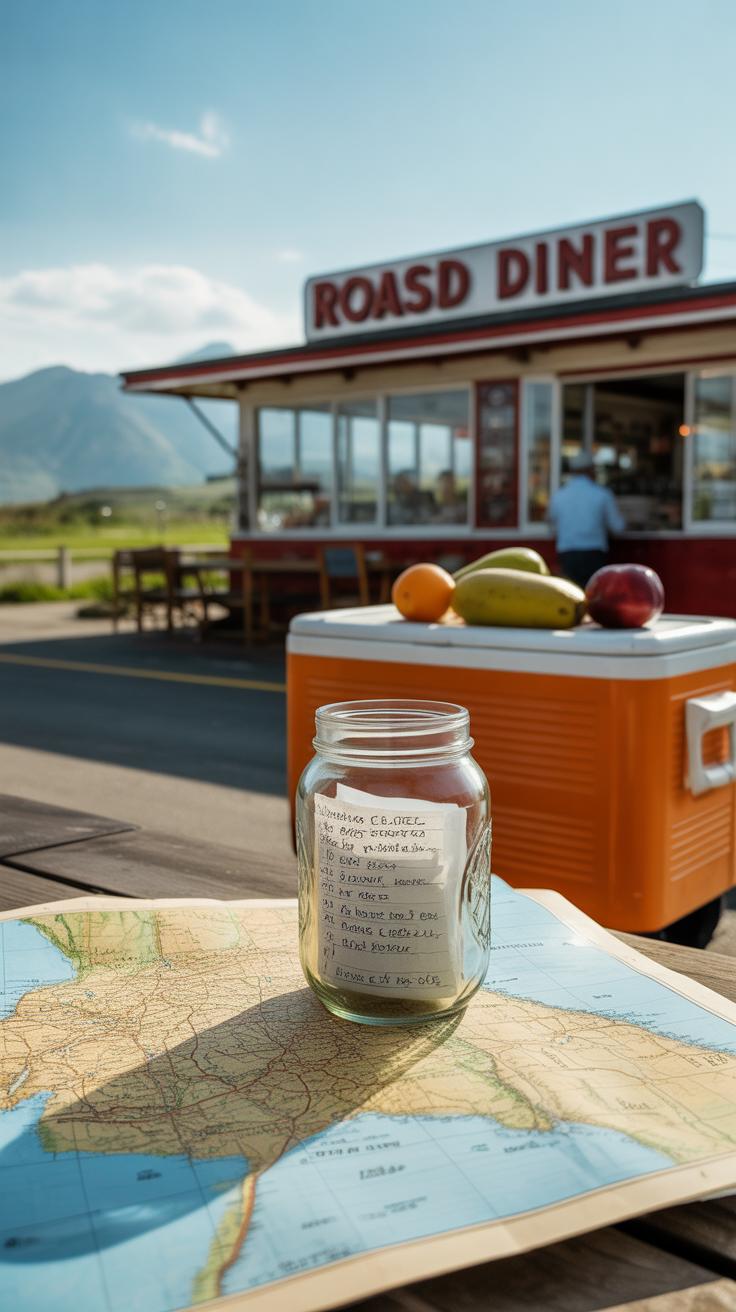
Planning your food before a road trip might sound like an extra hassle, but it really shapes your whole travel experience. When you eat well, your energy holds up better, and your mood stays steadier over long hours behind the wheel. Ever tried driving when you’re just a bit hungry? It’s surprisingly distracting, and fatigue creeps in faster than you expect.
Think about it: quick stops at fast food places can feel convenient but often leave you sluggish or cranky. When you prepare ahead, you avoid those spikes and crashes that come from unhealthy snacks or skipping meals. Plus, having your own food reduces the stress of deciding where to eat on the road—no last-minute detours needed.
There’s the money side, too. Eating out adds up fast, especially in touristy areas where prices can be a bit inflated. Bringing your own food allows you to stick to a budget and sometimes even enjoy tastier meals than what’s available at roadside diners. And by cutting down on those frequent gas station stops, you actually gain more time to enjoy the scenery or reach your next destination quicker.
Best Snacks To Pack For The Road

When it comes to snacks for a road trip, simplicity wins. You want food that’s easy to grab without making a mess, something you can munch on while driving or during quick stops. Think about snacks with a long shelf-life — those that won’t spoil in the car’s temperature swings or require refrigeration. This makes packing less complicated and helps avoid the stress of rushed stops looking for a cooler or ice packs.
Salty snacks like nuts or chips fit nicely here. Nuts, for example, are filling, portable, and don’t demand any special handling. A small bag of almonds, cashews, or peanuts can hold you over for miles. Chips may seem less practical because of their fragility, but sturdy packaged chips, like pita chips or thicker kettle-cooked varieties, can survive the trip well and satisfy that salt craving.
Sweet snacks are just as essential, and they don’t have to be candy bars or sugary treats. Dried fruits like apricots, raisins, or apple rings offer natural sweetness with fiber, plus they’re light and don’t spoil. Granola bars are another classic—they’re packable, portioned, and available in countless varieties, just watch for the ones overloaded with sugar if health matters to you.
Some of the best picks actually combine salty and sweet in one—trail mix, for example. It’s tough to beat trail mix for travel. It balances salt, sweetness, and crunch with nuts, seeds, dried fruit, and sometimes a bit of chocolate or coconut. Plus, it holds up well in different conditions, making it a steady go-to for many travelers. Packaged snacks like crackers or pretzels often last long and don’t spill or leave residue, which is something you might appreciate as you pile snacks into a bag.
At the end of the day, snacks that last long, are easy to carry, and don’t require preparation—those are your best bets. They let you focus on the road without worrying about your food falling apart or needing constant attention. Do you have a favorite roadside snack that always works for you? Sometimes it’s the odd little things that come in handy, not just the obvious choices.
Healthy Food Options To Keep You Energized
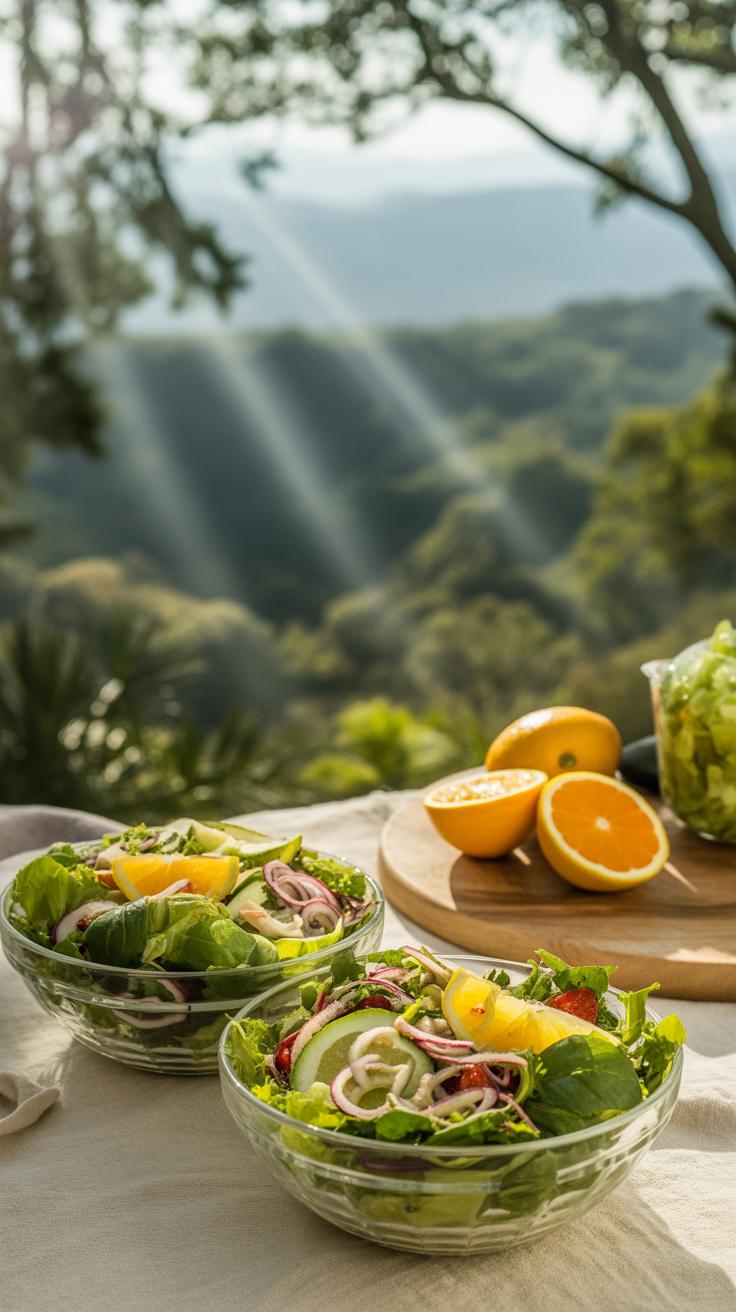
Keeping your energy up while driving is tricky, and what you eat on the road makes all the difference. The right snacks can prevent that mid-trip slump when your focus slips or you just feel… tired. So, what foods actually travel well and keep you fueled without turning into a mess?
Fresh And Easy Fruits And Vegetables
Think about grabbing some apples or carrots. They don’t spoil too quickly and don’t need refrigeration, which makes them perfect for a few hours at least. Apples give you a nice crunch and some fiber, while carrots bring a subtle sweetness and are great for snacking without leaving sticky fingers behind.
Maybe consider celery sticks or cherry tomatoes too. They’re easy to pop in your mouth without fuss. Sure, some vegetables wilt faster, but these hold up surprisingly well and can keep your mind sharp as you tackle long stretches of highway.
Protein Sources For Lasting Energy
Protein’s crucial—it slows digestion and keeps hunger at bay longer, which is key on a road trip where stops might be unpredictable. Cheese sticks are surprisingly good here; they stay fresh for a decent while if kept cool, plus, they’re not messy.
Boiled eggs—though a little fussier to prepare—offer great nutrition and are easy to eat while driving if you peel them ahead. Jerky’s another option, packed full of protein and pretty resilient without refrigeration. It’s a bit salty, sure, but sometimes that salt can actually help prevent dehydration on hot days.
There’s a bit of a balance to strike between convenience and nutrition, but these choices tend to hit that sweet spot. What’s your go-to protein snack in the car? You might find that switching it up keeps things interesting—and keeps you alert as the miles add up.
Storing And Handling Food During Travel
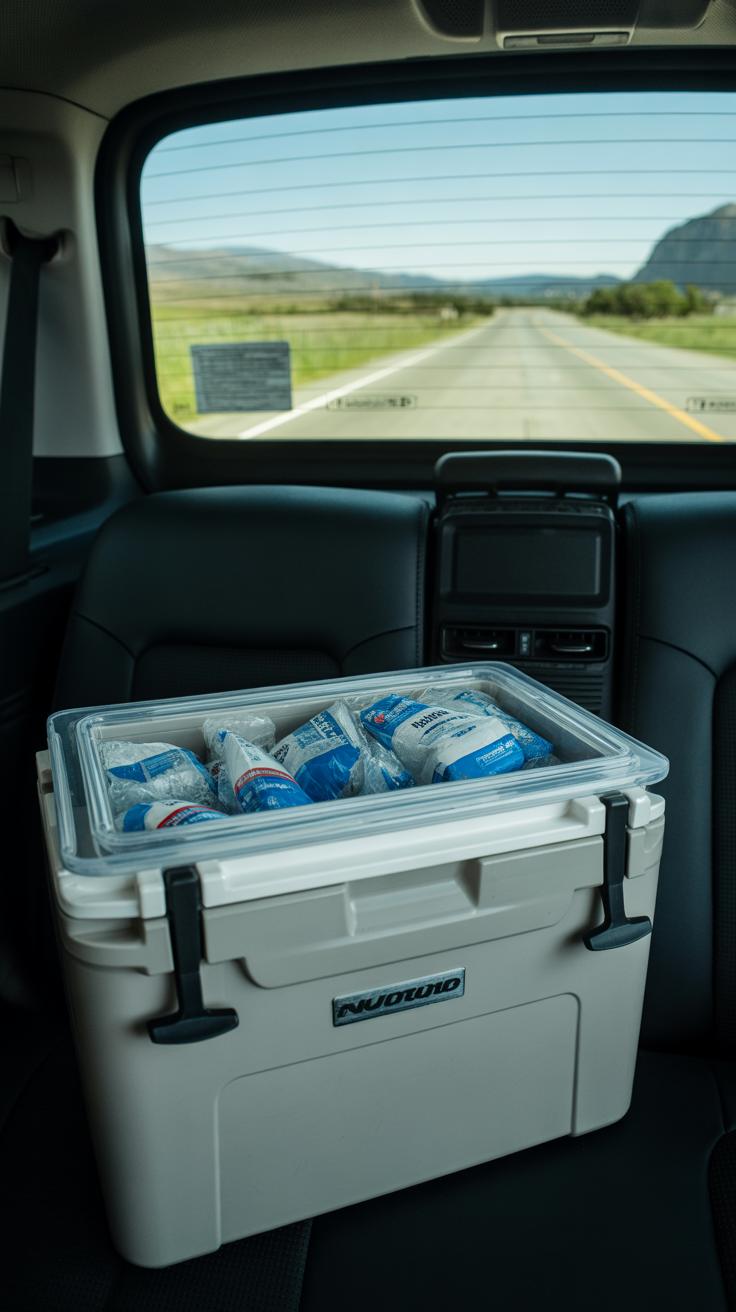
Keeping your food fresh while on the road can really change the whole vibe of your trip. If you don’t plan carefully, things spoil faster than you expect, and that’s just frustrating. Coolers and ice packs are your best bets for keeping perishables safe. Filling your cooler with enough ice or ice packs before you leave makes a big difference. But, sometimes the ice melts quicker than you’d like—especially if the car gets hot—so adding some frozen water bottles alongside your food can help keep the temperature steady longer.
When it comes to containers, airtight ones? They’re a lifesaver. They stop spills from ruining your stuff and also slow down food going stale. I usually pack sandwiches and chopped veggies in airtight containers because they hold in moisture and prevent any weird mix-ups in the cooler. Plus, it’s way easier to grab a container than to fiddle with plastic wrap or bags that might come loose.
Think about layering your cooler too. Keep raw meat or anything that could leak at the bottom, away from ready-to-eat foods. It might feel like overkill sometimes, but it’s less hassle than dealing with cross-contamination or a mess. Do you find yourself sneaking extra snacks from a cooler that’s too mixed up? Organizing food by type not only helps you find what you want fast, but can also keep everything fresher for longer. Sometimes I wonder if I’m a little too particular — but hey, better safe than sorry, right?
Simple Meals You Can Prepare Ahead
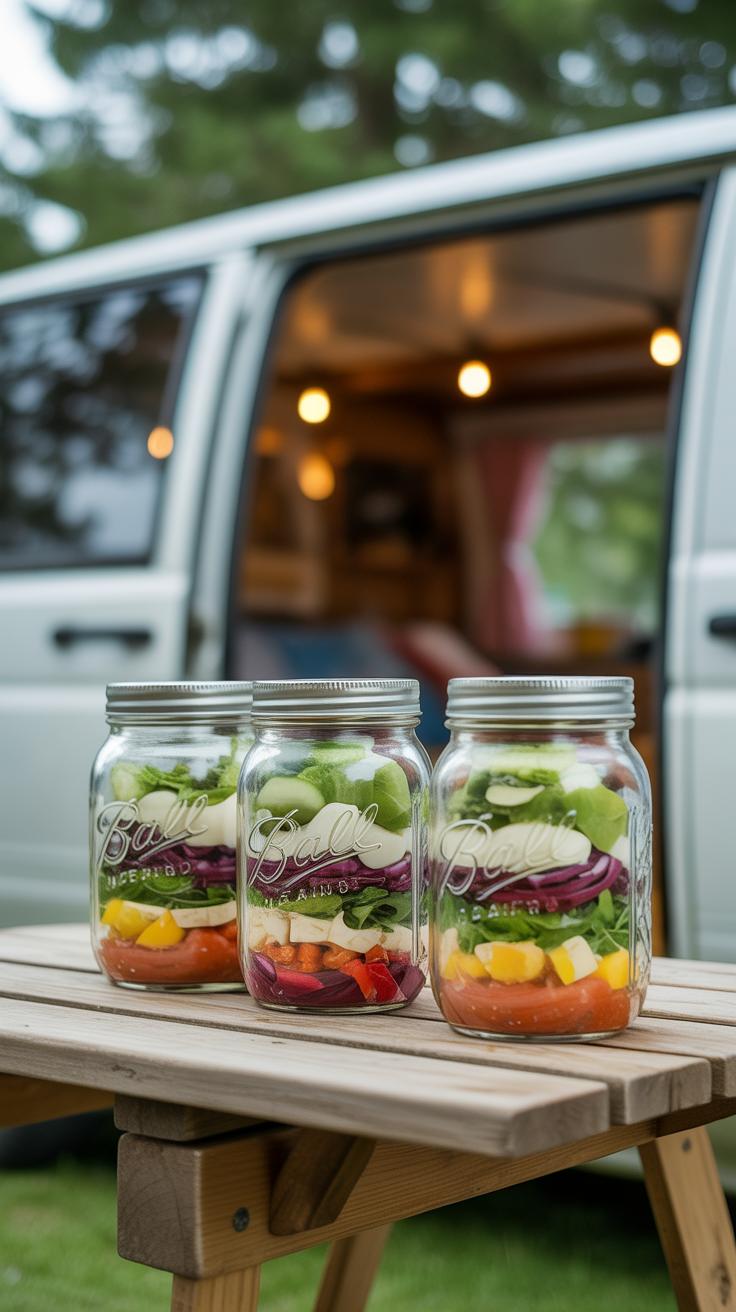
Preparing food before you hit the road can change the whole travel vibe. It stops those frantic snack runs and makes eating on the go less messy. Sandwiches, wraps, and salads are the classics here, but only if you choose ingredients that won’t turn soggy or mushy while traveling.
Make Ahead Sandwich Ideas
Think about sandwiches that stay fresh long enough without turning your bag into a swamp. Roast beef with horseradish mayo, turkey with swiss and spinach, or even a classic cucumber and cream cheese can work well. Using sturdy bread like ciabatta or baguette helps avoid soggy bites. Wrap sandwiches tightly in parchment or plastic wrap. That little effort keeps everything intact and makes tasting them more enjoyable despite the bumps on the road.
Easy Wraps And Salads
Wraps offer that neat, hand-held advantage and they often pack better than sandwiches. Try grilled chicken with hummus and roasted veggies or black beans combined with avocado and salsa for a vegetarian option. Choose tortillas over soft flatbreads since those hold fillings better.
Salads travel fine when you assemble them in layers, keeping wet ingredients separate until mealtime. Use mason jars or leak-proof containers to keep lettuce crisp. Mix kale, cherry tomatoes, olives, and feta with a drizzle of olive oil and lemon on the side. When you’re ready to eat, toss it up. It’s refreshing and feels less like eating roadside junk food.
Hydration Tips For Road Trips
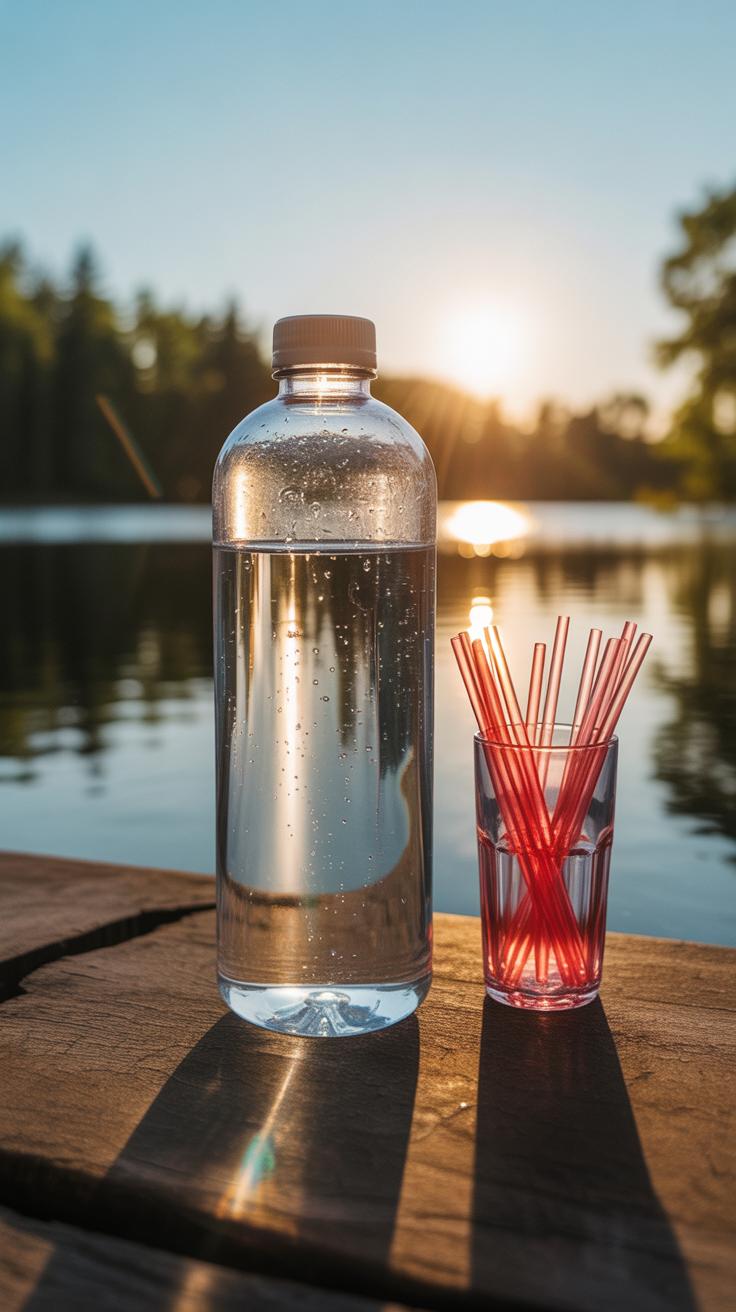
Staying hydrated during a road trip really changes how you feel behind the wheel. Thirst sometimes sneaks up on you, but dehydration can make you sluggish or give you headaches—both things you want to avoid when driving. Drinking enough water keeps your energy steady and can even help you stay alert, which is essential for long hours on the road.
How much water should you bring? A good rule is about half a liter (17 ounces) every hour you’re on the move. It might sound like a lot, and maybe you’ll drink less or more depending on the weather or your activity level. But having at least a couple of liters within reach makes sense.
Besides plain water, consider these drink options to keep things interesting without adding too much sugar or caffeine:
- Herbal teas, either warm or chilled, offer mild flavors and some soothing qualities without caffeine jolts.
- Diluted fruit juices give a hint of sweetness but avoid the overload of sugar you get from full-strength juice.
- Coconut water can be hydrating and provides electrolytes but might not be for everyone’s taste.
It’s easy to overlook drinks when packing, but skipping hydration can slow you down. So, next time you plan those sandwiches or wraps, don’t forget the bottle of water or the little extras that help keep you feeling fresh mile after mile. Have you ever felt gnawing thirst just after a quick snack? That’s the kind of thing hydration can prevent.
Handling Food Allergies And Preferences
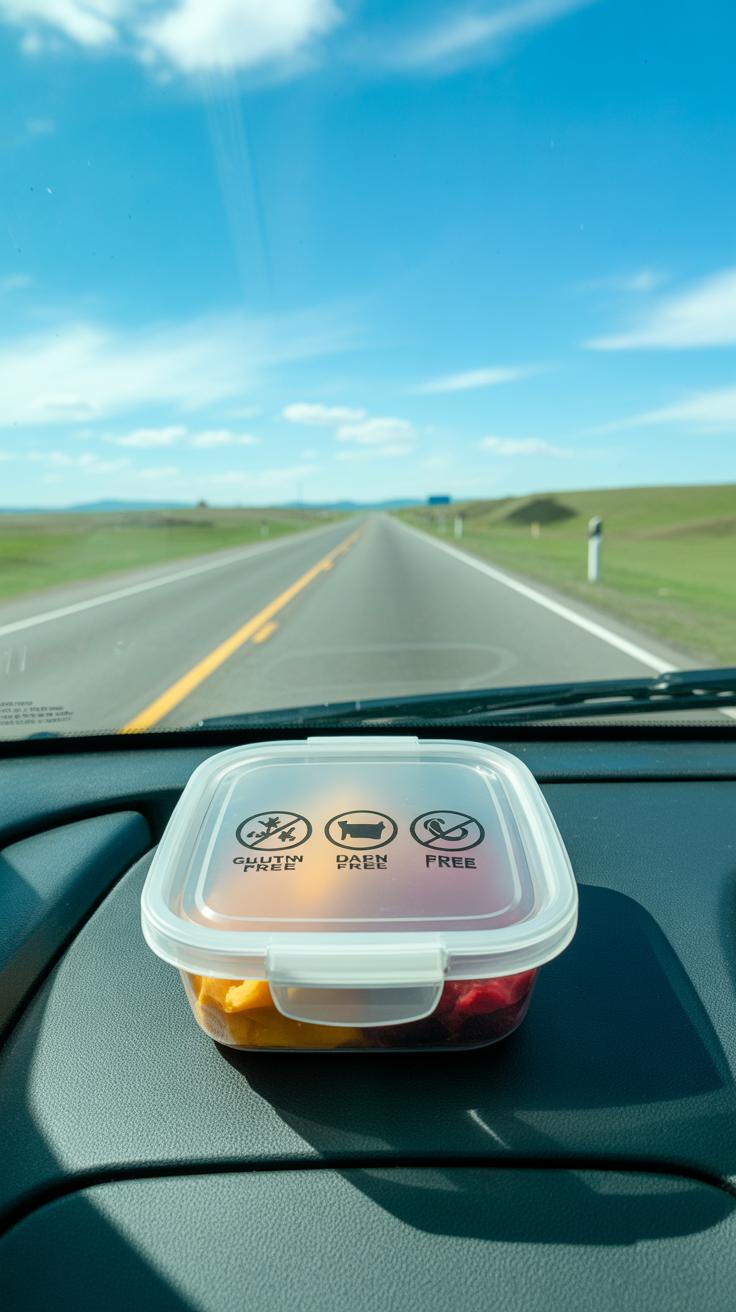
Managing food allergies on a road trip can be tricky, especially with limited stops and unpredictable options. It’s easier if you prepare ahead, though. Packing clearly labeled snacks that avoid your allergens takes some effort but saves stress later. Think of simple options like rice cakes, fresh fruit, or nut-free trail mixes. These items travel well and are less likely to cause issues.
But what if you’re traveling with vegetarian or vegan companions? It’s tempting to assume a gas station or convenience store will have something suitable, yet that’s rarely the case. You might need to bring your own meals or snacks. Items like hummus with sliced veggies, vegan jerky, or sturdy sandwiches made with plant-based ingredients work well and don’t spoil quickly.
Here are some ideas for allergy-friendly and plant-based snacks that can cover most preferences:
- Fresh apple slices or carrot sticks
- Homemade energy bars free of nuts and dairy
- Roasted chickpeas or pumpkin seeds
- Rice crackers with avocado or peanut butter alternatives
- Dried fruit without added sugar or preservatives
One thing to consider: even when labels say “free from” certain allergens, cross-contamination can happen. Trust your instincts and prioritize safety. Have backup snacks, just in case. You don’t want an allergic reaction miles from the nearest pharmacy.
Thinking about this in advance helps you stay in control and enjoy eating on the road without constant worry about what’s safe or not. And, honestly, eating something familiar and safe—even if simple—usually tastes better when you’re tired or hungry during long stretches of driving.
Avoiding Mess And Waste On The Road
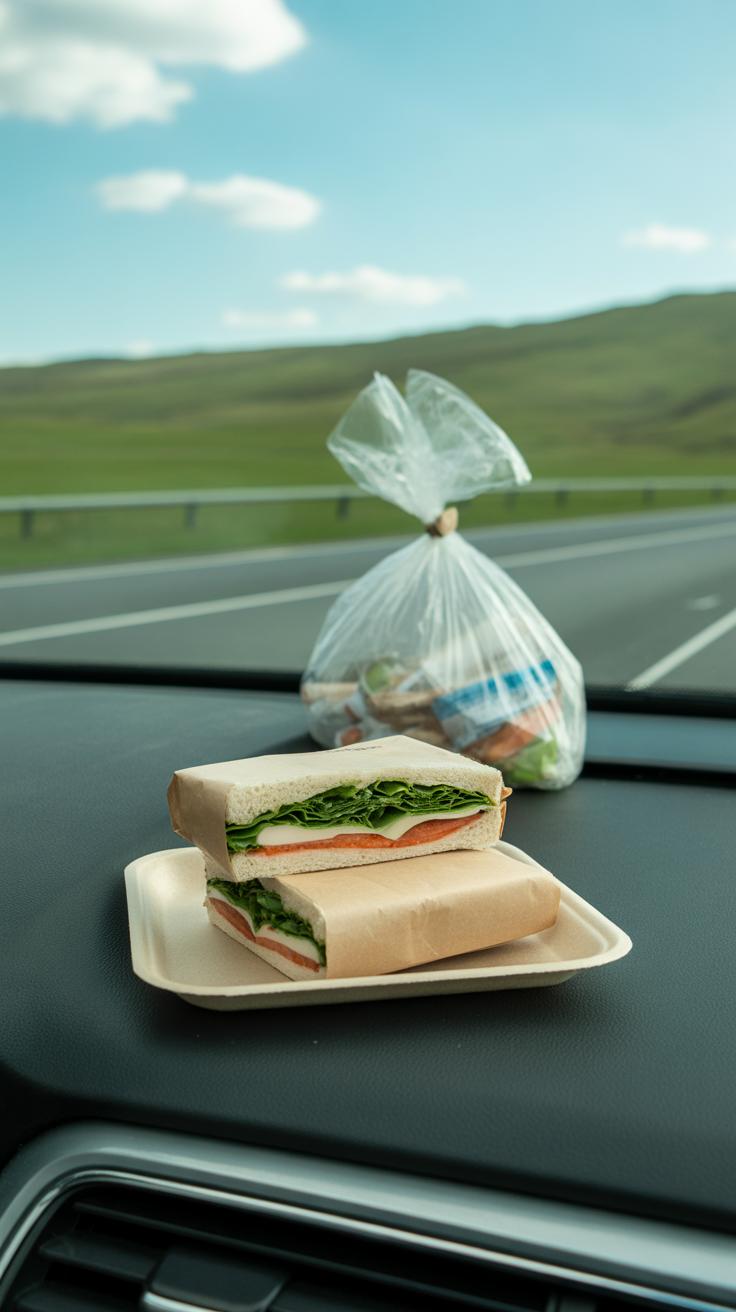
Smart Packaging For Easy Eating
Eating in a car can get messy if you’re not careful. Wrapping sandwiches in wax paper or reusable beeswax wraps works better than plastic bags—they keep things contained and avoid soggy bites. You might also think about packing food in individual containers, like small stackable boxes or bento-style trays. It helps keep flavors separate and limits spills.
Finger foods like sliced fruits, nuts, or cheese sticks are great too because they’re easier to manage without utensils. If you bring dips or sauces, try small, sealed containers instead of one big jar. It cuts down the risk of spills and makes portion control simpler. Honestly, finding the right balance takes some trial and error, but once you have your system, on-the-go meals feel less chaotic.
Managing Trash And Leftovers
Trash tends to pile up quickly when you’re on the road. A small, sealable bag or a compact bin dedicated to trash helps keep things orderly. I usually keep a couple of extra bags handy—just in case one rips or fills faster than expected. That way, you avoid tossing wrappers and crumbs on the floor or in your lap.
Leftovers deserve a little attention too. Use insulated containers or cooler bags to keep food fresh until you find a spot to throw it out or eat it later. Sometimes, leftover fruits or veggies can be saved with a quick rinse at rest stops, but other times they become gooey a lot faster than you’d want. If you don’t think you’ll eat it, better to pack only what feels reasonable. Wasting food on the road is something we all want to skip, right? But it can be tricky when hunger strikes unpredictably.
Finding Good Food Stops Along Your Route

Sometimes, bringing all your food along just isn’t practical—or maybe you want to stretch your legs and grab something fresh. If you’re not packing every meal, researching good food stops ahead can save a lot of stress and prevent last-minute unhealthy choices.
Before your trip, take some time to map out potential meal or snack stops. Look for places known for clean, fresh options rather than just highway fast food joints. Local diners, farmer’s markets, or small cafes can be gems, but they often don’t pop up on the highway signs. Searching online and reading recent reviews gives you a better idea of what to expect. Sometimes, photos and comments surprise you—or warn you away.
Trying local or fresh foods during your stops adds a bit of adventure. Maybe search for roadside fruit stands or markets where you can pick up seasonal fruits. Or plan a lunch at a small family-run place famous for their homemade dishes. These stops break up the road monotony and introduce new flavors that store-bought snacks can’t match. Just a thought—could that little town off your route have a bakery worth checking?
Apps can be your guide here. Using Yelp, Google Maps, or even specialized food apps lets you scan for nearby restaurants and check ratings and reviews in real time. Look for consistent comments about cleanliness and quality. The tricky part? Reviews can be mixed—some people have wildly different tastes or expectations. It’s best to weigh the overall pattern rather than relying on a single opinion.
When you’re on the road, quickly pulling up an app to see if a recommendation pops up nearby is a good move. Sometimes the best stops are unexpected, like a well-reviewed deli just a few exits away. Don’t be afraid to veer off your planned timeline if you spot something interesting. After all, isn’t part of the fun discovering good food in new places?
Conclusions
Choosing the right food for your road trip can make your travel experience better. Bringing simple, tasty, and healthy options helps you avoid hunger and saves time. Planning ahead stops you from relying on fast food or unhealthy choices along the way. You feel better, have more energy, and enjoy the journey more.
In your next trip, try packing easy snacks, balanced meals, and fresh options that travel well. Keep food safe and handy. Focus on your hunger needs and listen to your body. With these good habits, your road trip food will support your fun and safe travel. You are ready to enjoy all the sights and stops with no food worries.


